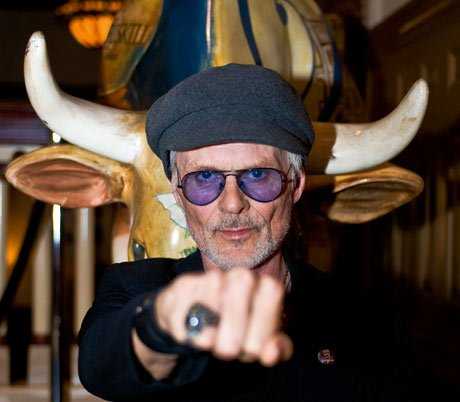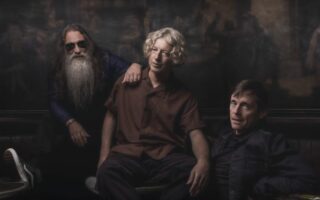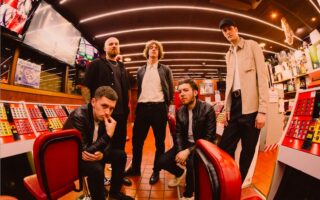Rock and roll, some numpty once said, is a young man’s game. Whoever they were, they’d clearly never heard of Lord Michael Des Barres.
He’s been in more bands than most of us have had hot dinners. He’s shared stages (and groupies) with everyone from Steve Marriott to Steve Van Zandt. He’s had 65 years on this Earth, and he doesn’t seem to have wasted a single day thus far.
From his days in Silverhead warming up for Deep Purple and Fleetwood Mac, through recording on Led Zeppelin’s Swan Song label, launching his ‘Rock Against Drugs’ campaign and fronting Power Station at Live Aid, Michael Des Barres is the name that fills the gaps in rock history.
There’s no false modesty to Des Barres; he’s led a fascinating life and he knows it. What’s more, the man certainly doesn’t shy from sharing his thoughts with an assemblage of Live4ever crew members at SXSW, waxing lyrical on musical contemporaries and successors. “Technology,” he says, “has dictated that you don’t need human beings…People don’t understand it anymore. Five guys – or girls – in a room, looking at each other and making a record in six hours is all I give a shit about.”
Des Barres wants to talk about his record. He wants to talk about real news. He wants to talk about anything and everything you care to ask him, and he’s so unapologetic, so refreshingly and eloquently opinionated that you start to wonder if he’s actually capable of uttering an unquotable sentence. He answers questions with tireless levity and panache, that Sussex boarding school accent softened with Californian affability and effortless man-of-the-world ease.
Most men, certainly most musicians in their sixties have little patience or passion for social media. You know who they are, pretending to be too cool for a Facebook profile, making Dad jokes about tweets and twits and how Snickers used to be called ‘Marathon bars’. Des Barres is not only keenly aware of this trend, he’s eager to buck it: “It’s how you use it…I want to be connected to people. And the way to do it is to respond to these people. So many people don’t. So many people think they’re so far above it that they can simply get the applause and not respond, but the way to gain an audience on a social network level is to respond and speak and have a conversation.”
He goes on: “I adore those people out there. I never call them fans. That’s why the gigs are packed. They’re there because they want you. They’re there because they like you. If you’re worried that music is free – which it is – they’re gonna buy something from you, because they love you. They care about you. Not about the music so much. Of course that’s important. And wearing the right trousers. But they’ve gotta have an affection for that person.”

Of course the glory days questions pop up. Des Barres isn’t guarded. There are, he insists, no forbidden topics, no parts of his chequered past he won’t spin you a quote for. He’s well past nostalgic tendencies though: “The good old days are right here, right now. It’s the good new day. If somebody says, ‘Michael, it’s just Wednesday’ I say fuck you, it’s the only Wednesday you’re ever gonna get. I never think about the good old days. They weren’t good old days. I was strung out on coke!”
He’s not even exaggerating. The music business has hardly been kind to Des Barres in the past, so he’s delighted with the turn of events that have seen downloads skyrocket over the last 10 years. “The middle man,” he grins, “was assassinated by self-expression.”
For him, these really are the best of times for musicians:
“I’ve been in many many big bands that have sold a lot of records and I have written a lot of hits for a lot of people. And most of the money from that work has gone to someone else. That doesn’t happen to me anymore because now we are in charge. We are autonomous. We own our music.”
He’s prouder of his recent achievements than anything else, having formed the Michael Des Barres Band in 2011 and released their first album, ‘Carnaby Street’ last July to great acclaim – chosen as a first-round nominee for Best Rock Album in the 55th Grammy Awards. He’s right to be proud; these are brash, ballsy tracks, recorded live for full face-melting potential. “I don’t believe in overdubs,” says Des Barres. “I loathe the whole notion of fixing anything…with Carnaby Street…we got to know it in the clubs…then you go to play it and it’s breathing.”
The record opens with bluesy brooder ‘You’re My Pain Killer’, the diary of an older man pleased to find himself turning a stagger into a swagger. Title track ‘Carnaby Street’ takes that swagger and translates it from youthful pride to admiration and awe for the world-shattering explosion of culture that originated in the streets of London.
‘Please Stay’ could be an Otis Redding ballad; it scrambles for soul satisfaction, soaring and cathartic as Des Barres’ husky vocals duel with arpeggiatic guitars trembling on some incredible threshold. He sums up the appeal of these kind of songs quite succintly. “It’s so simple. Art is about self-expression, but you’ve gotta find out who that ‘self’ is.”
‘Little Latin Lover’ lays the best claim to expressing who Michael Des Barres is, and not just because he calls it “the greatest rock and roll song ever written. By me.” It steamrolls into action to fight for the underdog, fists clenched, snarling and jabbing at the legislated injustice that tears families apart across borders. “I’ve lived in California for many, many years,” he explains. “I’ve become very conscious, very aware of and very in love with the Latin culture. The song is about deportation, and the destruction of families as a result…it’s about outmoded, archaic law.”

Des Barres is a man of willpower and convictions, not to be sidetracked from the things he cares about by attention-seekers like Tom Odell, who recently declared at the Brit Awards that rock and roll is dead: “Everything has been declared dead since the 13th Century. The Pope is dead. Bob Dylan is dead. Folk music is dead. Cajun punk rockabilly is dead. It’s just an attention-grabbing piece of shit ass fucking stupid thing to say. It’s a stupid cock sucking lying motherfucker who needs a head line.”
He cares even less about what downward spiral Justin Bieber is on: “Let him do his thing. If he survives, fine. But in terms of newsworthiness, I want to talk about the homeless.
I want to talk about people living in fucking cardboard boxes under bridges. I work with homeless teens. I work with kids who don’t have instruments to play. I’m not interested in Justin Bieber’s midnight activities. He can schtook Tom Cruise if he wants, I don’t care. I’ve other things to think about.”
So what does he care about? He cares about the gradual disappearance of authentic rock and roll. He cares about the truthful lyricists who stand in the way of that decline. He praises Eminem’s “human journalism”; the genius of Alex Harvey’s songwriting; he calls John Lydon “that Dickensian street philosopher”, and as for Jack White…
“Jack White is incredible. Like the Pistols made a thousand bands play, Jack White has turned a thousand bands onto Son House and RL Burnside, the great bluesmen – like The Black Keys and the Alabama Shakes… What he did about distribution was amazing. How he’s brought vinyl into the marketplace and also recorded very obscure artists, which would never have got the opportunity if it hadn’t been for Jack White. So I have the deepest respect for him.”
There’s something indomitable about Michael Des Barres’ outlook that seems to translate so easily into his music. He laments the undeserved attention that Gaga and One Direction get, as their vapid material is forced on the public. At the same time, he’s not worried in the least: “The choices have been minimised, if you look at one way. If you look at it another way, there is a myriad of choices because you’ve got the fucking internet.”
All in all, the man’s perspective can’t help but be swayed by the truly inspiring power he and his friends have to make a difference:
“I’m working with this thing called ‘Little Kids Rock’ that raises money to buy instruments for inner-city kids…we did this thing for little Stevie Van Zandt… and there’s the Boss, Elvis Costello, Gary US Bonds, Darlene Love…an amazing collection of singers. Incredible night. We raised a million dollars in three hours – and that money goes straight to schools in New York where kids so desperately want to play guitar, saxophone…and now they can. That’s important to me.”
Nobody could ever call Michael Des Barres modest. And by the sound of it, he has no reason to be.
Follow Michael Des Barres on Twitter
Simon Moore
.




